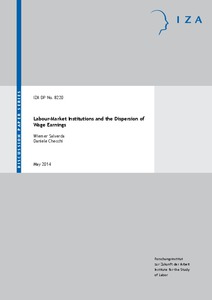Labour-market institutions and the dispersion of wage earnings

Salverda, Wiemer ; Checchi, Daniele
Institute of Labor Economics, Bonn
IZA - Bonn
2014
140 p.
household income ; labour market segmentation ; wage differential ; working time ; labour market policy
Discussion Paper
8220
Labour market
English
Bibliogr.
"Considering the contribution of the distribution of individual wages and earnings to that of household incomes we find two separate literatures that should be brought together, and bring 'new institutions' into play. Growing female employment, rising dual-earnership and part-time employment underline its relevance. We discuss the measurement of wage inequality, data sources, and stylized facts of wage dispersion for rich countries. The literature explaining the dispersion of wage rates and the role of institutions is evaluated, from the early 1980s to the recent literature on job polarization and tasks as well as on the minimum wage. Distinguishing between supply-and-demand approaches and institutional ones, we find the former challenged by the empirical measurement of technological change and a risk of ad hoc additions, without realizing their institutional preconditions. The institutional approach faces an abundance of institutions without a clear conceptual delineation of institutions and their interactions. Empirical cross-country analysis of the correlation between institutional measures and wage inequality incorporates unemployment and working hours dynamics, discussing the problems of matching individuals to their relevant institutional framework. Minimum wage legislation and active labour market policies come out negatively correlated to earnings inequality in US and EU countries."
Digital
The ETUI is co-funded by the European Union. Views and opinions expressed are however those of the author(s) only and do not necessarily reflect those of the European Union or the ETUI.